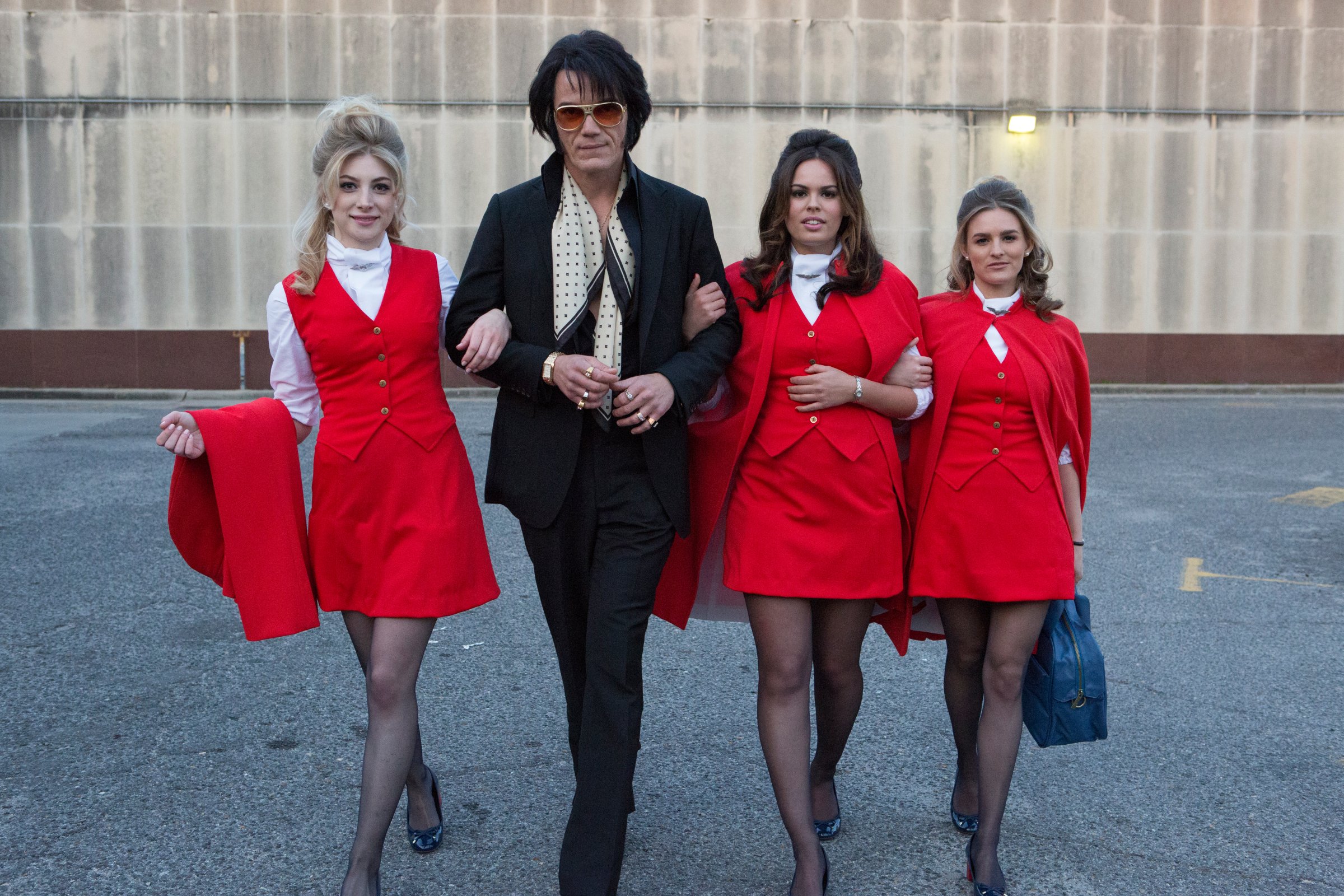
If you haven’t seen Michael Shannon lately, perhaps you just haven’t been to the movies. After collecting ample accolades for his shady real estate broker in last fall’s 99 Homes, he’s practically ubiquitous on the big screen now with three movies—Midnight Special, Batman v Superman and a new historical comedy, Elvis & Nixon, which premiered at the Tribeca Film Festival this week along with yet two other Shannon flicks: Wolves and Poor Boy. As if that weren’t a full enough plate, he’s also starring on Broadway opposite Jessica Lange in Eugene O’Neill’s Long Day’s Journey Into Night, rounding out a creative output that seems, a la General Zod, nearly superhuman.
As the King of Rock and Roll in director Liza Johnson’s Elvis & Nixon, which hits theaters April 22, Shannon plays Elvis not as a gyrating performer but as a concerned citizen hoping to use his influence to curb the pervasive drug use among youth in 1970. Based on an actual meeting between Elvis and President Richard M. Nixon (played by Kevin Spacey) in December of that year—one which generated the most requested photo in the history of the National Archives—the comedy imagines the Oval Office encounter in which the hippest cat asked the squarest square to bestow upon him the badge of a federal agent so that he might help carry out the president’s agenda.
Read More: Review: Spacey Meets Shannon, and Prez Meets King, in Elvis & Nixon
To channel the inner life of a much misunderstood star, Shannon relied heavily upon Elvis’ longtime friend Jerry Schilling, played by Alex Pettyfer in the movie. In the midst of a busy film festival schedule, Shannon talked to TIME about elevating his depiction beyond caricature and tapping into the psyche of a megastar.
TIME: How familiar were you with Elvis before you took on this role?
Michael Shannon: Oddly enough, I wasn’t very familiar with Elvis. I wasn’t a huge Elvis fan and I wasn’t really familiar with his story. But I read the script and I was very charmed by it. I was very excited because it wasn’t a standard biopic, it wasn’t trying to tell Elvis’ life story in 90 minutes, because that’s kind of a foolish errand. The fact that it was focused on this particular event and this particular period in Elvis’ life was a great opportunity to actually reveal a lot about him in a very concise way. I really immersed myself in his world and actually really fell for the guy. He’s pretty irresistible.
Did you fall for Elvis the person or Elvis the musician?
Both. I was never completely aware of just what an incredible artist he was, and I think that’s partially due to the fact that he’s not necessarily taken very seriously oftentimes. He’s been relegated to this kind of caricature, and I was interested to try and get beneath that. He kind of became trapped in his own persona, which is a tricky thing. Obviously he was grateful for all the blessings life bestowed on him and yet at the same time, I think he was a very restless person looking to excavate himself out of his own identity.
Do you think that’s why he wanted to get involved in politics?
He always was very mindful of civic responsibilities. I’ve heard stories—apparently he would pull people over for speeding and things like that. I think the badges represent a sense of authority for someone who probably didn’t always feel in control of his own life. I think as popular as Elvis was, he was looking for respect. Obviously not respect as a celebrity, because everybody agreed that he was a celebrity, but respect as a person, that he wasn’t simply a gimmick.
For a role like this, where does impersonation end and interpretation begin?
They are interwoven. I wasn’t approaching it like, it doesn’t matter if I look or sound like Elvis. I was trying to capture that to the best of my ability. Mimicry isn’t necessarily one of my fortes. But I got an interview from Jerry that they recorded for the movie Elvis on Tour, and they wound up not really using [it], so it’s an interview that most people haven’t heard. That not only helped me in terms of the voice of Elvis, but also in terms of his psyche, because it was a very candid interview, very conversational, a kind of behind-closed-doors, private version of Elvis. If the cameras weren’t rolling, I’d put that interview on. I must have listened to it 500 times.
Elvis’ demands to be a federal agent come across as a bit silly to the audience and to a lot of people around him, but you maintain his sense of dignity. How do you keep him from being the butt of the joke?
I think it had to do with the research I did. I had the good fortune of having Jerry Schilling around. Jerry knew Elvis very well and they and spent a lot of time together, and I let Jerry kind of guide me through this process. I trusted him. But honestly, I can’t really help advocating for any character I play, regardless of who they are. Otherwise I don’t really see the point in doing it. There’s so much out there that’s representing this other version of Elvis that I wouldn’t want to just add to that pile.
More Must-Reads from TIME
- Cybersecurity Experts Are Sounding the Alarm on DOGE
- Meet the 2025 Women of the Year
- The Harsh Truth About Disability Inclusion
- Why Do More Young Adults Have Cancer?
- Colman Domingo Leads With Radical Love
- How to Get Better at Doing Things Alone
- Michelle Zauner Stares Down the Darkness
Write to Eliza Berman at eliza.berman@time.com